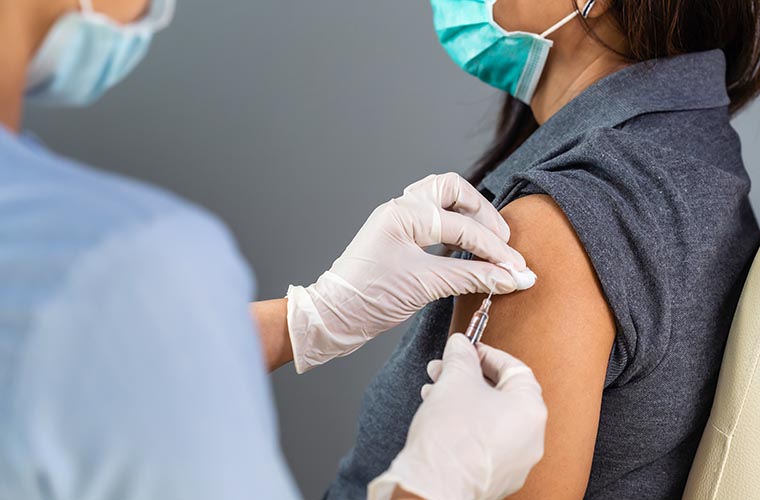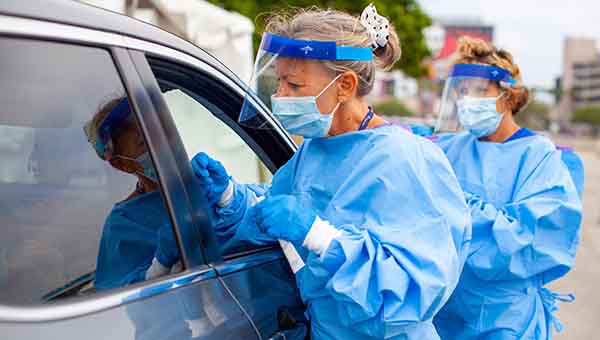Do's and Don'ts of COVID-19 Vaccines

As COVID-19 vaccines become more accessible across the United States, people have questions about what they should and should not do when receiving the vaccine.
To help provide some guidance, BayCare experts offer some helpful tips to keep in mind when getting vaccinated.
Get the Vaccine When Available
Science has shown that COVID-19 vaccines approved for emergency use by the U.S. Food and Drug Administration (FDA) are safe and effective. When the vaccines become available, BayCare medical experts encourage everyone to get vaccinated. Vaccination is intended to prevent people from getting seriously ill if they get infected and help slow the spread of virus.
Practice Safety Precautions
People need to continue to practice safety measures even after receiving the COVID-19 vaccine. While some people are getting vaccinated, they may still be able carry the virus and infect others who aren’t vaccinated. First and foremost, wear a mask when social distancing is hard to maintain or in areas of poor ventilation. Practice social distancing by staying at least six feet from those outside your household. Frequently wash your hands and try not to touch your nose and mouth.
Diet and Exercise Restrictions
BayCare experts say COVID vaccinations do not require any specific diets. People can stick to their normal day-to-day food intake. However, they recommend eating, sleeping well and drinking plenty of water before getting each dose of the vaccine. This will help strengthen your immune system.
Medical Procedures
There are no restrictions for planned medical procedures, routine medical visits or laboratory testing when getting the COVID-19 vaccines. However, a recent study from the journal of Radiology shows that COVID-19 vaccinations can cause enlarged lymph nodes in the armpit or near the collarbone, which may be misinterpreted as a sign of a health problem. That’s why, health experts around the country recommend that patients postpone routine mammograms and other routine imaging tests for at least six weeks after the last dose of vaccine.
Medications
It’s not advised to take pain relief medications before getting the COVID-19 vaccine. However, if people experience symptoms after getting the vaccine, such as fever, they’re encouraged to frequently drink fluids, dress lightly and talk to their health care provider about taking over-the counter medication for fever reduction.
Quarantining after Vaccine
People who are vaccinated and have been exposed to COVID-19 are not required to quarantine if they are fully vaccinated, are within three months of the last vaccine dose and are asymptomatic, according to the Centers for Disease Control and Prevention (CDC). However, people who do not meet that criteria, should follow current CDC guidance and quarantine for 10 to 14 days after exposure to someone with suspected or confirmed COVID-19.
Getting COVID-19 during Vaccination
People who receive the vaccine can still get infected with COVID-19. However, health care experts hope the vaccine will help people from getting seriously ill if they get infected. If people contract COVID-19 before their first dose or second dose, they need to wait at least 14 days before getting either dose. For more guidance, they should reach out to their physician and discuss their best course of action.
Traveling After Vaccination
While the vaccines can provide protection against COVID-19, people still should proceed with caution when traveling. Traveling can be safer, but it will take time before everyone gets access to a vaccine. That’s why, it’s important to have a large number of the people vaccinated before going back to some traveling normalcy. We also have to keep in mind that each dose of the vaccine takes weeks to be fully effective, so it’s important to plan travel accordingly.
Dining After Vaccination
Dining at a restaurant can be safer after getting vaccinated. However, BayCare experts recommend eating outdoors instead of indoors. This will help reduce the transmission of COVID-19 to other restaurant goers who may not be vaccinated.
Visiting Friends and Family
Visiting friends and family can be safer after vaccinations. However, medical experts recommend following current CDC safety precautions when seeing loved ones. Vaccinated people could still pose a health risk to unvaccinated family members and friends. If you chose to visit family, follow safety precautions by wearing a mask and social distancing.
For information on COVID-19 including vaccines, visit BayCare.org/Coronavirus.


